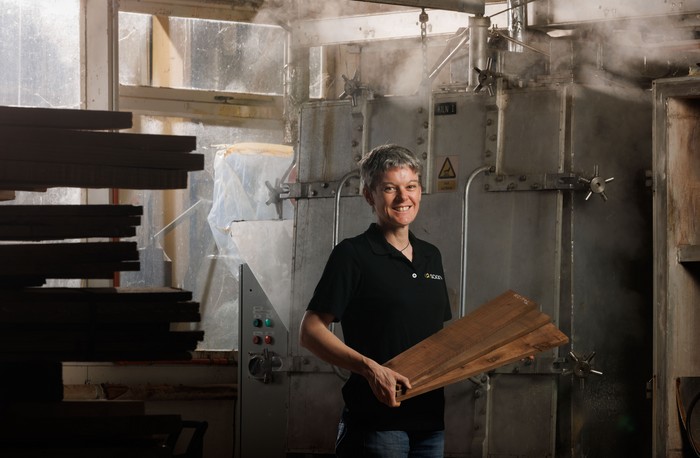ROTORUA, New Zealand
,
January 19, 2024
(press release)
–
Thermally modifying tōtara to increase durability opens new doors. It could only be a matter of time before a locally grown indigenous and specialty wood species is seen on the outside of iconic buildings in Aotearoa if early research results are anything to go by. Scion scientists have been researching whether thermally modifying tōtara could enhance its durability enough for exterior building uses, opening the door for a wider range of products and applications. Thermal modification is a well-established method in which timber is heated to high temperatures without oxygen. The process enhances wood dimensional stability – meaning it shrinks and swells less with changes in moisture content. A high degree of modification can increase wood durability making it more likely to be suitable for exterior uses like cladding and decking. Radiata pine is not naturally durable but has been successfully thermally modified to increase durability and this product has been commercialised for cladding. Scion’s research into thermally modified tōtara began around 2017 using relatively young trees from Northland – about 80-years-old. Tōtara (Podocarpus totara) was chosen because it has natural durability and tests have been done with both the generally nondurable sapwood – living, outermost portion – and potentially durable heartwood – dead, inner wood. Testing is also being done on the exotic species Mexican cypress (Cupressus lusitanica). Scion senior technologist Rosie Sargent says while any thermally modified species will have some improved durability, tōtara and lusitanica have been the most successful to date. To get sufficient durability for New Zealand conditions, the wood must be modified at very high temperatures. “It’s a question of does it perform for specific applications and can you do it without destroying the wood.” After thermal modification, the wood is tested for durability using long-term accelerated field tests and fungus cellar stakelet trials. The tests are chosen with the aim of being able to assess if the product can meet building and durability standards. The fungus cellar creates ideal fungus growing conditions to speed up decay. Small wooden stakelets are left in the controlled high-decay situation and the level of decay is assessed over time and can be compared to the performance of known products. The stakelets remain in test until all are rotted away. The thermally modified tōtara has been in the fungus cellar for about six and a half years, and the lusitanica for more than three years. In comparison, untreated radiata pine stakelets can severely decay in as little as six months. In the field, durability testing is being done on accelerated decking and L-joints made from thermally modified tōtara and lusitanica as per international testing protocols. Both species have been in field testing for about two years. Tests can take anywhere from five to 10 years and non-durable wood such as radiata sapwood will fully decay much quicker. While testing in both the field and fungus cellar is ongoing, early results are positive, Sargent says. “We’re finding that it increases the durability of both the sapwood, which isn’t durable, as well as the heartwood which is.” Interim portfolio leader (Trees to High Value Wood Products) Elizabeth Dunningham says it is important to have data about indigenous products and trees to make good planting and product development decisions, as existing data is limited. She says there were also strategic reasons for choosing tōtara. Scion is directly involved with Taitokerau Māori Forestry Inc. as partners in the Tōtara Industry Pilot. This resulted in new markets for the farm-based tōtara, with the view of developing a regional industry. Chairman of Taitokerau Māori Forests Inc, Ernest Morton, says the group supports Scion’s work: “Tōtara haemata (Lofty leader). He Rākau Rangatira o te Ngahere (Chief of the Forest).” For more information contact Rosie Sargent 
We’re finding that it increases the durability of both the sapwood, which isn’t durable at all, as well as the heartwood which is. - Rosie Sargent
* All content is copyrighted by Industry Intelligence, or the original respective author or source. You may not recirculate, redistrubte or publish the analysis and presentation included in the service without Industry Intelligence's prior written consent. Please review our terms of use.




